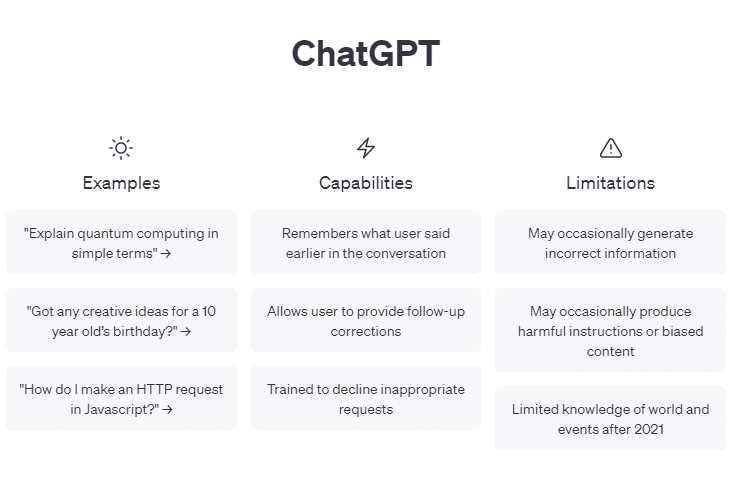Artificial Intelligence (AI) exists in various shapes and forms. However, most individuals associate AI with content creation or even artwork replication.
Chief Marketing Officers (CMOs) need to understand what AI is and how to use the technology to advance their digital marketing campaigns.
It’s crucial to clearly understand the limitations, benefits, and drawbacks of utilizing AI technology for content creation, particularly in terms of implementing more efficient and cost-effective solutions in marketing strategies.
This CMO guide to AI content production will help you stay up-to-date on the latest AI developments, so you can be better equipped to use it in your marketing endeavors.
Download this post by entering your email below
What is AI?
If you’re a new CMO with little experience in the content production world, you may need a better idea of what AI writers do and how they affect marketing trends.
AI content writers like ChatGPT and others can create written content within seconds.
The chatbots have been fed data that lets them study human language, mimic tone, and gather information from all corners of the internet.
Even Google has launched its chatbot, Bard, which closely monitors human language to mimic it.
However, CMOs must understand that AI isn’t only useful for content creation. It can have various uses, and some of the most popular include the following.
AI chats
Have you ever visited a website and seen a chat box lingering on the corner of a landing or home page?
Chat boxes are incredibly convenient for businesses that don’t provide 24/7 customer service but still want to deliver some service to their clients.
Today, many businesses take advantage of cost-effective AI chatbots, which can offer guidance similar to a human customer representative.
AI in sales
Businesses of all sizes are increasingly using AI in the sales process.
From lead generation and personalization to predictive analytics and automated emails, AI can help identify potential customers and give them the right information they need to make a purchase.
AI can even help you develop targeting strategies, customize ads to fit the interests of different buyers, and provide real-time feedback or insights on how well your campaigns are doing.
AI in SEO
Search engine optimization (SEO) is one of the most important aspects for any business to gain customers online.
SEO allows you to optimize content and perform better on search engine result rankings, letting more customers find your business.
But did you know that many SEO programs use the power of AI to scan existing content online for keywords and their prominence?
Programs like Surfer SEO, arguably one of the most widely used and trusted SEO tools available today, use AI to help businesses get better and more accurate data on their SEO efforts.
AI for talking points
A CMO might also use AI to create content like talking points, outlines, conversation summaries, and a wide range of other resources to help their marketing teams.
AI can generate talking points automatically, allowing your team members to understand what to do or say to attract customers, stay updated on the latest trends, and maintain an edge over their competition.
Any software you use today, from email generators to grammar checkers, might already use AI to help you improve the content you create. Why do AI chatbots suddenly face a backlash for blog and image content creation?
AI, Content Creation, and Google’s Algorithms
CMOs need to distinguish between AI used for digital marketing in traditional capacities (such as listed above) and AI used for new content creation to understand the main issues with AI content marketing.
Are both equally beneficial? Is one worse than the other?
AI for writing content
First, knowing how different AI chat programs work, and their capabilities is important.
AI chat programs use artificial intelligence to read and analyze existing content, then generate new content based on these findings.
They also use natural language processing (NLP) tools to make it seem that the written content came from a human instead of a bot.
A CMO should guide their content team to use AI wisely to save time that can be used for researching and curating articles, for example.
Some of the most popular AI chatbots today include:
- ChatGPT
- Jasper
- Bing Chat
- Chatsonic

While these chatbots appear convenient for marketers and content creators, they can only partially do the content creators’ work.
When these chatbots create content, they do so by mimicking human language.
The result is that a certain fake tone, filled with robotic language and, at times, repetitive phrasings throughout the draft, makes it easy to distinguish from human-written content.
Although this type of content might be great for churning out many low-quality articles quickly and creating a solid base for your blog, it won’t help you build trust among your readers and customers.
Google’s algorithm
Google’s algorithms are so sophisticated that they can easily detect when an AI chatbot has written the work.
Remember that representatives from Google have stated that as AI increases, they will keep up with these adapting chatbots to distinguish robotic from human-generated content.
As a CMO, it’s vital to understand how to keep AI-generated content from falling into the realm of spam and still be able to harness AI’s efficiency and creativity for your company’s success.
Possible negative outcomes
What does it mean if Google finds AI-generated content on your website?
While some might think that if they are found using AI to create content, it automatically means Google will issue a warning or even ding their site and drop it in rankings, the truth is a bit more complex.
Google’s spam policy states that using AI automation appropriately and responsibly isn’t necessarily against their guidelines.
However, creating keyword-stuffed content pieces that do nothing for the audience and try to game the system can jeopardize your website’s chances of appearing in the SERP.
Penalties can affect your search rankings for a particular web page, or they might affect your website altogether.
The AI Paradox
Even with the detriment of using AI for ill-sounding, repetitive, and factually incorrect articles, content creators and CMOs are still flocking to AI chatbots to create content.
Around 37% of businesses are using AI, leading to a 40% boost in productivity. Why?
It has something to do with the AI paradox, which is an effect of using AI for content creation.
By its very nature, AI has made creating content a commodity, meaning people are willing to pay to get content pieces done quickly and efficiently.
Producing content quickly helps businesses reach their content-production goal. However, it also leads to a race to the bottom in terms of quality when it comes to the actual output of these chatbots.
The result is that human-generated content is now incredibly valuable, with some companies opting to use only human-generated content instead of AI bots and paying top dollar for this content.
Sites like WriterAccess now have features, including AI checkers, to ensure all written content pieces are 100% human-generated and authentic, giving peace of mind to those using the service.
Implementing AI Use in Content Creation
AI is revolutionary and as a CMO, you must know how to use it for content production.
Your team can have blog posts, e-books, and other digital marketing campaigns in virtually the blink of an eye.
However, because you cannot rely solely on AI to produce good quality content you can publish, the most important thing is to have human experts to ensure all written content is factually correct and logically coherent.
You’ll also want to ensure your team understands the limitations of AI use and works to correct any mistakes, repetitive phrasing, and overall robotic tone that could be key failings of AI use.
So long as your content helps your customers find answers and provides accurate information, you can be well on your way toward your business success.
At Rock Content, we learned the power of the combination between human creativity and artificial intelligence. We invite you to dive into this AI revolution!







